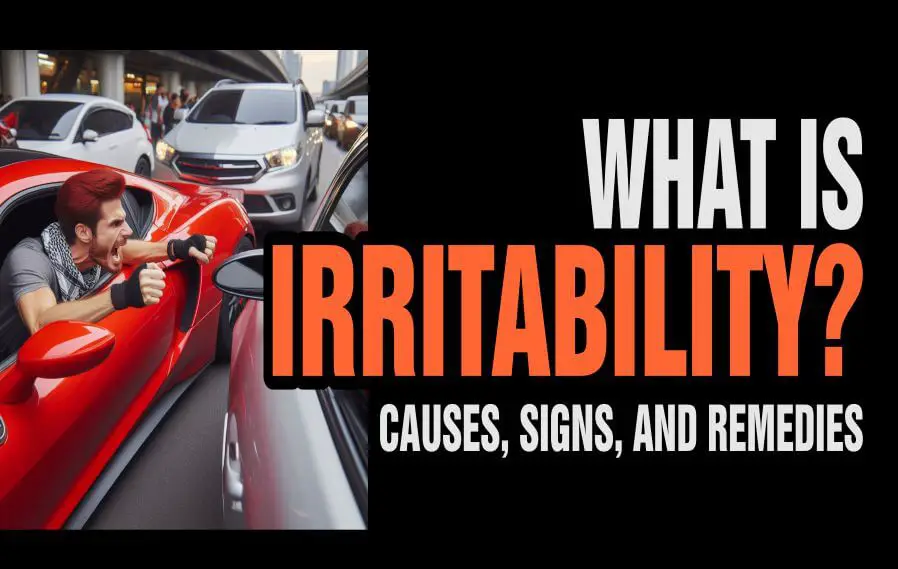Last updated on December 21st, 2023 at 05:17 am
Get the question “What is irritability?” answered, and discover effective strategies to curb its effects and improve your well-being.
Get the question “What is irritability” answered, and discover effective strategies to curb its effects and improve your well-being.
Irritability is a common result of human emotions, characterized by a heightened state of sensitivity or easily provoked annoyance.
While occasional irritability is a normal response to stress or certain situations, chronic and excessive irritability can have a profound impact on your overall well-being.
This article aims to shed light on what irritability is, its potential causes, and the detrimental effects it can have on your mental, emotional, and physical health, and we have tips to curb it.
Irritability goes hand in hand with impatience as it is one of the physical manifestations of loss of emotional control, an indication that you have lost grip on your emotions.
Table of Contents
- What is Irritability?
- What is Extreme Irritability?
- Anxiety and Irritability
- Signs of Irritability
- What Causes Irritability?
- The Impact of Irritability on Overall Wellbeing
- Coping Strategies and Management
- Where to Get Online Help for Irritability
- Frequently Asked Questions
- Final Thought
What is Irritability?

Irritability generally is a state of being easily agitated or prone to reacting negatively to various stimuli.
It may manifest as impatience, restlessness, grumpiness, or frustration towards individuals, events, or even yourself.
Irritability can range from mild annoyance to explosive outbursts, depending on the individual and specific triggers.
Related: What is Emotional Intelligence? How to Cultivate it
What is Extreme Irritability?
Extreme irritability, also known as irritable mood, is a psychological state characterized by intense frustration, restlessness, and a heightened sensitivity to irritating stimuli.
Individuals experiencing extreme irritability often find it difficult to control their emotions and may display impulsive or aggressive behaviour.
This condition can be associated with various mental health disorders such as bipolar disorder, borderline personality disorder, or attention deficit hyperactivity disorder (ADHD).
It is important to note that extreme irritability can significantly impact your quality of life and relationships.
Seeking professional help and treatment options, such as therapy and medication, can be beneficial in managing this condition.
Also Read: Detrimental Effects of Multitasking on the Brain
Anxiety and Irritability
Anxiety is a psychological condition characterized by excessive worry, fear, and apprehension.
People with anxiety may experience physical symptoms such as rapid heartbeat, sweating, and tense muscles.
This heightened state of arousal can lead to irritability, as individuals may feel on edge, easily angered, and quick to react negatively to small triggers.
On the other hand, as described in the definition, irritability is a common emotional response to anxiety, as constant worry and stress can drain your energy and patience.
It is important to address both anxiety and irritability as they can impact your mental well-being and relationships, and seeking professional help or practicing relaxation techniques may be beneficial in managing these symptoms.
Also Read: Life Hacks For Stress Reduction And Relaxation
Signs of Irritability
These signs can vary in intensity and may be accompanied by other emotional or physical symptoms, and it’s important to address them to improve overall well-being.
1. Increased Impatience: Irritable individuals may find themselves becoming easily frustrated or agitated when things don’t go as planned or when others don’t meet their expectations. This impatience can lead to a shorter fuse and a decreased tolerance for minor inconveniences.
2. Tendency to Snap or Lash Out: People experiencing irritability may tend to react with anger or hostility to situations that wouldn’t typically provoke such a response. This can manifest as verbal outbursts, arguments, or even physical aggression in extreme cases.
3. Heightened Sensitivity to Stimuli: Irritable individuals may find themselves more sensitive to noise, light, or other environmental stimuli. Everyday sounds or sights that wouldn’t usually bother them might become sources of irritation or distress.
4. Difficulty Concentrating: Irritability can make it challenging to focus on tasks or conversations, as the individual’s mind may be preoccupied with feelings of frustration or annoyance. This can lead to decreased productivity and increased stress.
5. Muscle Tension: Physical symptoms such as muscle tension, clenched jaw, or headaches can accompany irritability. The body’s response to stress and frustration can manifest as physical discomfort or pain.
6. General Sense of Unease or Frustration: Irritable individuals may experience an overall feeling of unease, restlessness, or dissatisfaction. This can contribute to a negative outlook and a sense of being constantly on edge.
Also Read: Beliefs that Will Hamper Your Personal Growth
What Causes Irritability?

Numerous factors can contribute to irritability including psychological, physical, environmental, lifestyle and interpersonal factors.
Let’s take a closer look.
1. Psychological Causes of Irritability
Several psychological factors can contribute to causing irritability as you can see below:
Stress: High levels of stress can lead to irritability. When you are overwhelmed by various demands, responsibilities, or adverse life events, your emotional threshold may decrease, making you more susceptible to irritation.
Anxiety: Anxiety disorders can cause irritability as a symptom. Persistent worry, fear, and the anticipation of potential threats can put you in a constant state of tension, making you more prone to irritability.
Depression: Depression is often associated with irritability. Feelings of sadness, hopelessness, and low self-esteem can manifest as irritability, as you may struggle to manage your emotions or have a decreased ability to cope with stressors.
Sleep Disturbances: Lack of sleep or poor sleep quality can contribute to irritability. When you do not get enough restorative sleep, you may feel tired, fatigued, and easily triggered by minor frustrations.
Chemical Imbalances: Certain neurotransmitters, such as serotonin and norepinephrine, play a significant role in regulating mood. Imbalances in these neurotransmitters can lead to irritability and other emotional disturbances.
Frustration and Unmet Needs: When you feel frustrated due to unmet needs, desires, or expectations, you may become more easily irritated. Frustration arises when obstacles hinder the fulfillment of your goals or when there is a discrepancy between desired and actual outcomes.
Personality Traits: Certain personality traits, such as high levels of neuroticism, may predispose you to be more prone to irritability. People with neurotic tendencies tend to be more sensitive to negative emotions and may react strongly to stressors.
Substance Abuse and Withdrawal: Chronic substance misuse or withdrawal from substances like alcohol, narcotics, or stimulants can lead to increased irritability. These substances can impact brain chemistry and disrupt emotional regulation, exacerbating irritability.
Related: 10 Powerful Emotions Used in Persuasion
2. Physical Factors that Causes Irritability
Physical discomfort arising from medical conditions like chronic pain, hormonal imbalances, or medication side effects can amplify irritability levels.
Let’s take a look:
Neurotransmitter Imbalances: Neurotransmitters are chemical messengers in the brain that help regulate mood and emotions. Imbalances in neurotransmitters such as serotonin, norepinephrine, and dopamine can lead to irritability. For example, low levels of serotonin are associated with increased irritability.
Hormonal Changes: Hormones play a significant role in regulating mood. Fluctuations in hormone levels, especially during certain phases of the menstrual cycle, pregnancy, or menopause, can contribute to irritability. For instance, premenstrual syndrome (PMS) is known to cause irritability due to hormonal fluctuations.
Nutritional Deficiencies: Inadequate intake of certain nutrients can affect brain function and mood stability. For example, deficiencies in B vitamins, magnesium, zinc, or omega-3 fatty acids have been linked to increased irritability.
Chronic Pain or Illness: Physical discomfort or chronic pain can contribute to irritability. Conditions like fibromyalgia, arthritis, or other chronic illnesses can lead to irritability due to the constant discomfort and limitations they impose.
Medications Or Substances: Certain medications, such as some antidepressants, stimulants, or corticosteroids, can have side effects like irritability. Additionally, substance abuse or withdrawal from substances like alcohol or drugs can also lead to irritability.
It is important to note that these physical factors do not solely cause irritability but can contribute to its occurrence.
Various psychological and environmental factors can also play a role in determining an individual’s irritability level.
Related: How Emotions Shape Thoughts and Behaviours
Environmental Factors that Causes Irritability
Overstimulation from loud noises, crowded spaces, or chaotic environments can trigger irritability.
Additionally, exposure to excessive heat, extreme weather conditions, or air pollution may contribute to irritability.
Let’s take a look:
Noise Pollution: Loud and constant noises, such as traffic, construction, or nearby parties, can be a major source of irritation. Continuous exposure to high levels of noise can cause stress and frustration, leading to irritability.
Air Pollution: Poor air quality due to pollutants such as vehicle emissions, industrial waste, and smog can negatively affect physical and mental well-being. Breathing in polluted air can cause discomfort, respiratory problems, and irritation, which can contribute to an overall sense of irritability.
Temperature Extremes: Extreme temperatures, whether too hot or too cold, can make people feel uncomfortable and irritable. Heat waves and excessive humidity can lead to dehydration, exhaustion, and heat-related illnesses, all of which can contribute to irritability. On the other hand, extreme cold can cause discomfort and physical stress, which can also lead to irritability.
Crowded Spaces: Overcrowding in public spaces, public transportation, or living quarters can increase stress levels and irritability. Lack of personal space, long queues, and limited privacy can all contribute to feelings of frustration and irritability.
Light Exposure: Bright and harsh lighting or exposure to fluorescent lights for extended periods can cause eye strain and headaches, leading to irritability. Additionally, disruptions in natural light patterns, such as working in windowless environments or frequent time shifts (e.g., in shift work), can disrupt sleep-wake cycles and lead to irritability and mood disturbances.
Social Factors: Interpersonal issues, such as conflicts, lack of social support, or strained relationships, can significantly impact your mood and increase irritability. Work-related stress, high expectations, and unrealistic deadlines can also contribute to irritability.
Uncomfortable Living Conditions: Living in unsanitary, cramped, or uncomfortable housing can increase stress levels and irritability. Poor living conditions can include inadequate heating or cooling, lack of essential amenities, or exposure to pests or molds.
Related: How Emotional Power Is Harnessed And Applied For Personal Growth
The Impact of Irritability on Overall Wellbeing

The repercussions of chronic irritability extend far beyond momentary discomfort.
Its effects permeate various aspects of overall wellbeing. Let’s examine them:
Mental Health: Irritability often coexists with mental health disorders such as depression, anxiety, or personality disorders. It can worsen symptoms, decrease coping skills, and hinder mental health recovery. Persistent irritability can also strain personal relationships, leading to social isolation and feelings of loneliness.
Emotional Health: Frequent irritability can disrupt emotional regulation, making it difficult to control anger or negative emotions. This can lead to emotional exhaustion, heightened stress levels, and a general decline in emotional wellbeing.
Physical Health: Chronic irritability can have detrimental physical effects, ranging from increased blood pressure and heart rate to tension headaches, muscle pain, and digestion issues. Additionally, poor sleep quality resulting from heightened irritability can compromise overall physical health.
Quality of Life: Regular irritability can adversely affect daily functioning, impacting performance at work or school and hindering personal relationships. It can limit social interactions, lower productivity, reduce self-esteem, and overall diminish the quality of life.
Related: Phrases That Make You Emotionally Intelligent
Coping Strategies and Management
Dealing with chronic irritability requires a holistic approach focused on self-care and developing healthy coping mechanisms.
Some strategies to manage irritability include:
Identifying Triggers: Understanding the specific situations or stimuli that provoke irritability can help manage and avoid them whenever possible.
Self-awareness and Acceptance: Acknowledging and accepting your irritability as a genuine concern enables a proactive approach towards finding suitable coping mechanisms.
Stress Management Techniques: Incorporating stress-reducing activities such as exercise, mindfulness, deep breathing exercises, or engaging in hobbies can help alleviate irritability.
Healthy Lifestyle Choices: Adopting a balanced diet, getting adequate sleep, reducing caffeine and alcohol consumption, and increasing physical activity can significantly impact irritability levels.
Seeking Professional Help: If irritability persists or significantly affects daily life, seeking support from a mental health professional can offer guidance, therapy, or medication when necessary.
Also Read: Also Read: How to Sharpen Your Intuition
Where to Get Online Help for Irritability
If you are experiencing irritability and need online help, there are several resources you can turn to.
Here are a few options (not in order of importance):
1. Mental Health Websites
Numerous websites focus on mental health and offer resources on various issues, including irritability.
Websites like HelpGuide, Verywell Mind, and PsychCentral provide informative articles, self-help guides, and tips to manage irritability.
2. Online Therapy Platforms
There are various online therapy platforms where you can connect with licensed therapists conveniently.
Services like BetterHelp, Talkspace, and Amwell offer therapy sessions through video calls, phone calls, or messaging.
You can discuss your irritability with a professional and receive guidance and support tailored to your needs.
3. Support Forums and Communities
Online forums and communities dedicated to mental health can be a valuable source of support.
Websites like Reddit have dedicated subreddits where people share their experiences and seek advice.
Examples include r/mentalhealth, r/anxiety, or r/depression.
You can find specific subreddits related to irritability and connect with others who may have similar struggles.
4. Mental Health Apps
Many smartphone apps are designed to assist with mental well-being.
Apps like Calm, Headspace, and MoodPath offer meditation exercises, mood tracking features, and coping mechanisms for irritability. They can provide daily support and guidance to manage your emotions effectively.
5. Online Counseling Services
Some organizations provide free or low-cost counseling services remotely.
Websites like 7 Cups, which offer listeners who provide emotional support, or Crisis Text Line, which allows you to text with trained volunteers during times of distress, can be beneficial in managing irritability.
Related: The Relationship Between Emotional Intelligence And The Brain
Frequently Asked Questions
What is the irritability meaning?
Irritability refers to an increased likelihood of responding in an irritable or negative manner to stimuli, often due to heightened sensitivity.
What is irritability biology?
Irritability in biology refers to a physiological response to stimuli, often involving neurotransmitter imbalances, hormonal changes, or other physical factors.
What does it mean to be irritable?
To be irritable means to be easily provoked to anger, impatience, or frustration, often resulting in a heightened emotional response to stimuli.
What is the meaning of irritability in the body?
In the body, irritability refers to a state of exaggerated sensitivity to stimuli, potentially leading to increased reactivity and emotional responses.
Final Thought
Irritability, while a common and often transient emotion, can have harmful effects on overall wellbeing when it becomes chronic and excessive.
Recognizing its causes and implementing effective coping strategies is crucial in managing irritability and preventing its detrimental impacts on mental, emotional, and physical health.
By prioritizing self-care and seeking support when needed, you can enhance your overall wellbeing and restore emotional balance.
References:
- Healthline: What Causes Irritability?
- Judd L, et al. (2012). Prevalence and clinical significance of subsyndromal manic symptoms, including irritability and psychomotor agitation, during bipolar major depressive episodes. DOI: 10.1016/j.jad.2011.12.046
- Mayo Clinic Staff. (2019). Stress symptoms: Effects on your body and behavior.
mayoclinic.org/healthy-lifestyle/stress-management/in-depth/stress-symptoms/art-20050987 - Buou Health: 8 Irritability Causes & How to Stop Being Irritable
- Mayo Clinic Staff. (2018). Mood disorders. mayoclinic.org/diseases-conditions/mood-disorders/basics/definition/con-20035907
- https://www.healthdirect.gov.au/irritability-and-feeling-on-edge
- https://www.medicalnewstoday.com/articles/325564
- https://www.ncbi.nlm.nih.gov/pmc/articles/PMC4848029/
Pious Clements is the insightful voice behind "The Conducts of Life" blog, where he writes about life ethics, self-development, life mastery, and the dynamics of people and society.
With a profound understanding of human behaviuor and societal dynamics, Pious offers thought-provoking perspectives on ethical living and personal growth.
Through engaging narratives and astute observations, he inspires readers to navigate life's complexities with wisdom and integrity, encouraging a deeper understanding of the human experience and our place within society.
